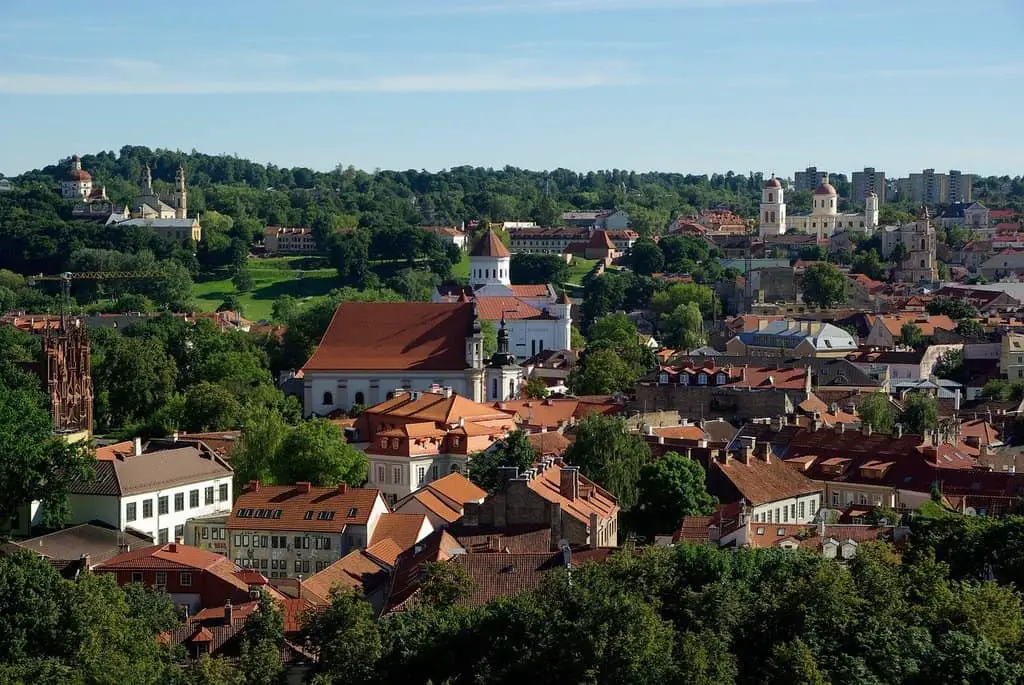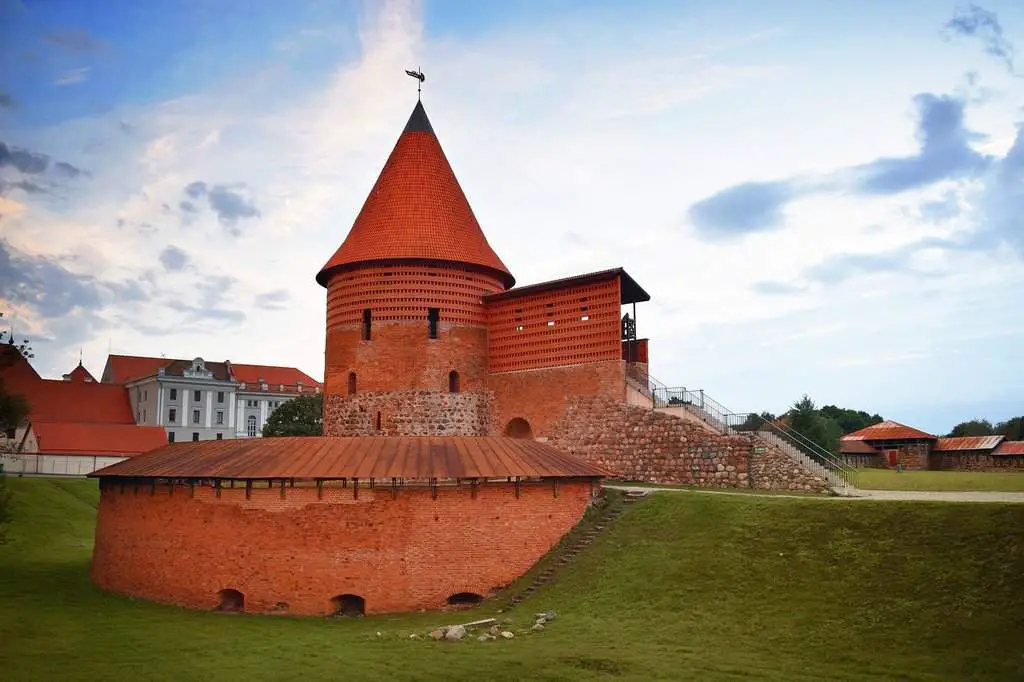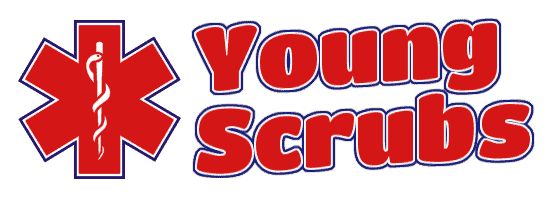This post may contain affiliate links, click here to learn more.
Lithuania is 1 of 3 countries making up the baltic states. It is located at the eastern bank of the baltic sea in northern Europe.
Modern Lithuania gained its independence from the Soviet Union in 1991. Today it is a high-income, advanced economy that ranks well in terms of Human Development and enjoys a high standard of living.
There are 2 universities offering medical studies in English to international students.
- Vilnius University (Vilnius)
- Lithuanian University of health sciences (Kaunas)
Medical school in Lithuania
Medical school in Lithuania is a 6-year Master’s program that leads to an MSc degree (Master of Health Sciences).
Students are eligible to apply for enrollment if they have or will have a high school diploma before enrollment.
Students should have good grades in natural sciences (Biology and chemistry). Furthermore, students should be proficient in the English language.
The final decision for which applicants are accepted is determined by an entrance exam or SAT subject test results.
Once enrolled, students typically follow a module that starts out with basic science subjects, from which students are gradually introduced to clinical subjects and clinical rotations.
After successfully passing the final examination, students earn their MSc degree. The degree is recognized across the European Union, as well as in North America (and more).
Vilnius University

The University of Vilnius is one of the oldest and most famous establishments of higher education in Eastern and Central Europe.
Located in the capital of Vilnius, It was founded in 1579, and for a long time, it served as the only school of higher education in Lithuania.
Because of this, the university host a wide range of faculties hosting over 20 000 students enrolled in its study programs.
The Faculty of Medicine is one of the largest and most significant faculties in the university. It currently enrolls over 3200 students, 130 of whom are international students, a number that is increasing every year.
Admission requirements
In order to be eligible for enrollment, you have to have completed secondary school/high school, and be eligible for higher education in your home country.
You have to have taken biology in high school, and other natural science courses like physics, mathematics, or chemistry are favorable.
Also, you required to have taken an SAT test in biology or an MCAT exam and achieved a minimum score not more than 2 years ago by the time of applying. The tests can be taken in your home country or any other country where the test is offered.
For the SAT exam, you have to have taken a subject test in biology E or M and achieved a minimum score of 600, and for the MCAT exam, you need a minimum score of 500.
In addition to certifying your competency in natural sciences, these tests also serve as your proof of English language proficiency.
If you have a degree in Biomedical Sciences you can apply without taking the SAT or MCAT Test. Also, if you apply via selected agencies that work with the university you are not obliged to take the Tests.
If this applies to you, you have to have proof of English language proficiency. This can be a university English degree or proof of completing an SAT or MCAT Test. alternatively, the following language tests are considered acceptable:
- Test of English as a Foreign Language (TOEFL) with a score of 65+
- International English Language Testing System (IELTS) with a score of 5.5+
- Cambridge English B2 First (First Certificate of English) with a score of 160+
Application process
The academic year starts in September every year. The university typically opens up to applications at the start of the new year.
The deadline for handing in your application is May 1st if you are a non-EU/EAA citizen and June 1st if you are an EU/EAA citizen. Only full applications will be considered so be sure to include all the necessary documents. This includes:
- Certified copies of your secondary school/high school diploma and grade transcript. If issued in a language other than English, Lithuanian or Russian they have to be supplemented with an official translation.
- Motivation letter (between 1200-4000 characters)
- Proof of payment of 100 EUR application fee.
- Recommendation letters (minimum 1)
- Certified copy of photo ID (passport or ID card)
- Certified copy of SAT biology M/E or MCAT test with the result.
- English language proficiency certificate (for students who have not taken SAT or MCAT test)
The application is handed in via the university’s online application system. You may also be requested to send them by mail.
Your application will then be evaluated based on several factors, but the most important ones are your high school grades, test results (SAT/MCAT and English) and motivation letter.
If you are selected, you will receive an acceptance letter via the online application system. You have to confirm that you accept the offer within 7 working days.
After accepting the offer of admission, you will receive an invoice for payment of the tuition fee as well as additional information with regard to your enrollment.
You may also be requested to send the original copies of your final diploma with supporting documents by mail or bring them when you arrive to begin your studies.
Follow this link to the Universities website to read more about the application process and its individual steps. You can also check out the university’s promo video below.
Tuition fee
In addition to the one-time 100 EUR application fee, students pay an annual tuition fee of 11 000 EUR.
Lithuanian University of health sciences

Lithuanian University of health sciences is the largest institution for biomedical studies in Lithuania. It is located in Lithuania’s second-largest city, Kaunas, just west from the capital of Vilnius.
The university houses several faculties in health-related subjects, including medicine veterinary medicine, dentistry, pharmacy nursing and many more.
The university has a long tradition of hosting international students and offers a 6-year medical program in English that leads to an MSc degree (Master of Health Sciences).
Admission requirements
In order to be eligible for enrollment, you have to have completed or be in the process of completing secondary school/high school and be eligible for higher education in your home country.
You should have taken biology and chemistry in high school, and other natural science courses like physics and mathematics are favorable.
Students are required to document sufficient English language skills. A B2 level or equivalent in English is required.
Based on the application, you can be found eligible to sit for an entrance exam. This can be taken in Lithuania or in selected cities abroad. You will be tested in Biology and Chemistry.
If you have a university degree in a biomedical field, top grades in both biology and chemistry, or have taken an SAT Subject Test and achieved a minimum score in the related subjects, you might be exempted from the entrance exam.
Application process
The university opens up the application process in November and the deadline for applying being mid-June.
Entrance exams are hosted continually from January to early July. Despite the long application period, You are recommended to apply as early as possible.
You have to submit your application online through the university’s application platform. The following documents have to be submitted:
- Copy of your secondary school/high school diploma and grade transcripts. Have to be provided in original language plus an authorized English translation
- CV
- Motivation letter
- Copy of your passport or other photo ID
- Health certificate based on a complete basic medical examination
- Passport-sized photo.
- English language proficiency certificate (TOEFL, IELTS, B2 Level CEFR or adequate)
- Score report on SAT subject tests in chemistry and biology (if available)
If you are yet to finish high school at the time of application you can still apply, but you have to provide an official letter certifying your progress and your most recent academic results.
Also, you can still apply even though you are not able to present any certificate proving your English language skills. In this case, you will have to take an English language test prepared by the University on the same day as the entrance exam.
After submitting your application, you will receive feedback on whether you are eligible to continue the application process or not. If you are found eligible, you have to pay a 150 EUR application fee.
Unless you are exempted from the entrance exam, you have to sit for the entrance exam. The exam is similar to an SAT subject test where you are presented with 30 multiple choice questions in biology and chemistry.
Based on your exam results, you can be selected to receive an offer to enroll at the university.
Follow this link to the Universities website to read more about the application process and its individual steps. You can also check out the university’s promo video below.
Tuition fee
In addition to the one-time 150 EUR application fee, students are also required to pay a one-time 250 EUR registration fee upon enrollment. After this, the annual tuition fee is currently 11 500 EUR.
Recognition of degree
Both of the universities above are registered in the world directory of medical schools. Because Lithuania is a member of the EU, the degree should be recognized and accepted across all member states.
This means that graduates are eligible to apply for a license to practice and work as doctors in any EU country.
Students are eligible to practice in North America and Canada upon graduating, granted they pass all necessary examinations. Both universities are listed in the world directory of medical schools as meeting ECFMG requirements.
This means that students are eligible to sit for the USMLE Step 1 and 2 exams and apply for an ECFMG certification before being able to complete the US certification process by passing the USMLE Step 3.
Degrees from the universities are also accepted by the medical council of Canada. This means that graduates are eligible to practice medicine in Canada granted they pass the required examination (MCCQE part 1 and 2).
The degrees are accepted in many more countries across the globe, however, most countries have their own requirements for foreign medical graduates before they can start practicing medicine.
Before applying, make sure to contact the appropriate regulatory body in your country with regards to recognition of the degree upon completion.
Cost of living in Lithuania
The cost of living in Lithuania is in line with most other eastern European countries. On average, this is substantially lower than in most western European and North American countries.
Students can find accommodation for anywhere between 200-450 EUR per month. On average, apartments are less expensive if you move away from the city centers and if students rent together.
The cities have cheap and efficient public transportation networks with numerous buses. A monthly student travel pass usually only costs about 6 EUR.
Food is cheap, especially if you cook at home. Depending on how much you eat a student spends anywhere between 100-200 EUR on food every month.
Every once in a while you can enjoy dinner at a restaurant which will cost anywhere between 20-35 EUR depending on the restaurant and the food. A big mac menu costs around 5 EUR, and most importantly, a regular size (0,5L) beer will cost around 2.5 EUR.
Overall, the cost of living is comfortable for most international students, but everything depends on your budget.
English language test
As mentioned, all the universities require all non-native English speakers to provide documentation of English language proficiency. The following tests are considered acceptable:
- Test of English as a Foreign Language (TOEFL)
- International English Language Testing System (IELTS)
- Cambridge English language exams.
Also, certificates issued by language schools with a B2 English level are also accepted, in addition, certificates of English language proficiency issued by a secondary school a candidate attended might be accepted.
If you are unsure whether you meet the criteria for English language proficiency (e.g. you had English in high school but are unsure of the level), contact the individual university for more information.
Closing remarks
Overall, medical studies in Lithuania offer a great opportunity to study medicine in one of the 3 stable democracies that make up the baltic states.
The opportunity is especially enticing for European students, as the degree is accepted in most (if not all) member states without the need for extra examinations.
If you are interested in the possibility to study medicine in Lithuania, make sure to check out the links provided above. Here you can get additional information about the application process.
